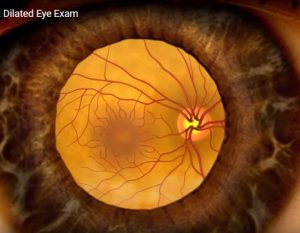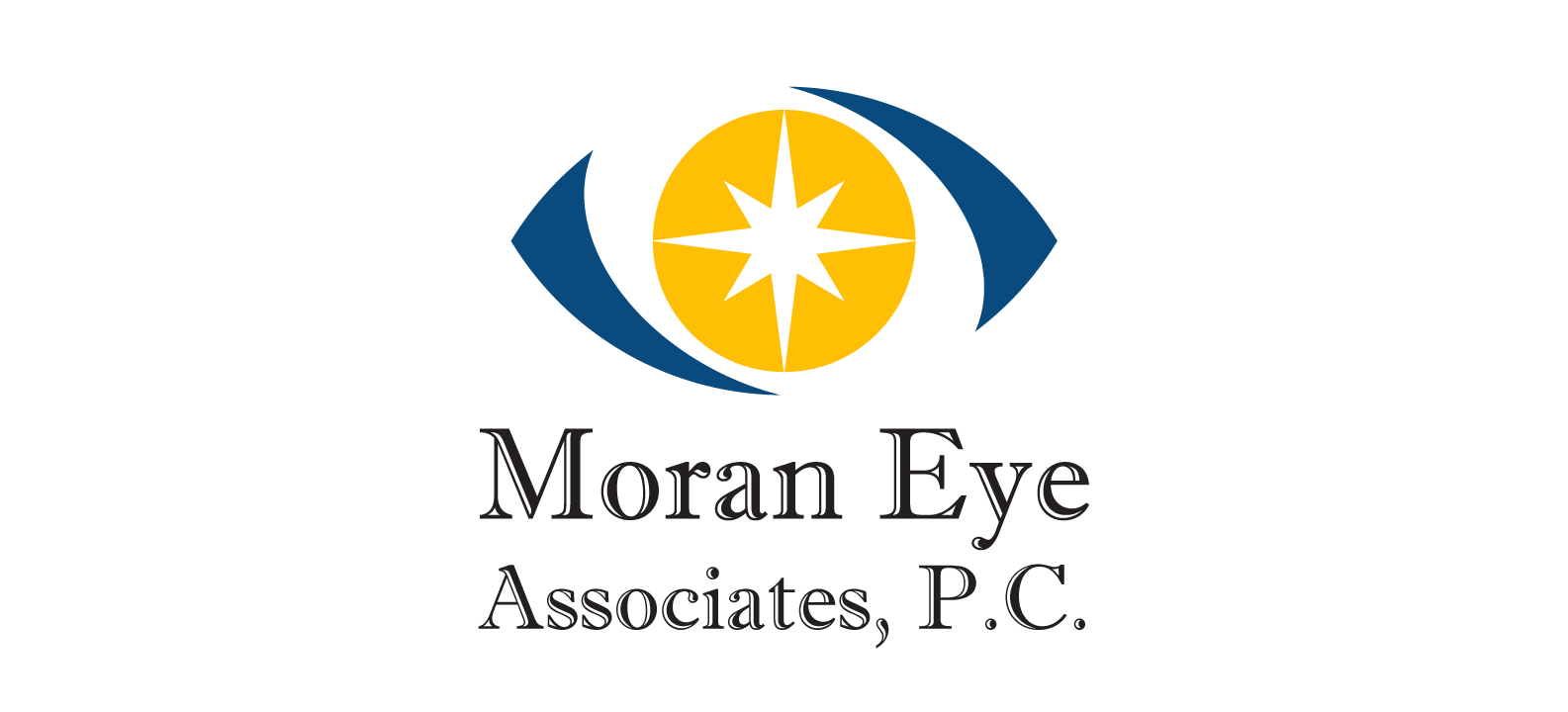by Dr. M | May 13, 2019 | Appointment, Cost, Diabetes, Exam, Glaucoma, Medical Eye Care, Office, Referral

Health insurance can be very confusing. We talk to patients about it everyday, so we thought it would be helpful to outline the basics.
We can’t stress enough that every plan is different. While you may be covered for a service, you may have a co-pay or deductible that must be paid. If you aren’t sure, please check with your human resources department or insurance company.
MEDICAL INSURANCE: Exams that qualify for Medical Insurance include care and treatment of eye disease and injury. Among the conditions covered are Glaucoma, Cataracts, Diabetic Retinopathy, Macular Degneration, Injury to the Eye, and Infection.
Most medical insurances do NOT cover the cost of checking to see if you need new glasses. This part of the exam is called Refraction (Better 1 or 2?), and is NOT part of medical eye care. Refraction is a separate charge.
VISION INSURANCE: Some benefit plans include vision insurance. Each plan’s coverage is unique, so you need to check specifics with your insurance plan. Items that MAY be covered under vision insurance at a reduced cost or co-pay include your routine eye exam, contact lens fitting, glasses and contact lenses.
Again, we recommend checking with your insurance company to verify your coverage, co-pay and deductible.
We are here to help if you need any treatment information or diagnosis codes so that you can discuss specifics with your insurance provider.
Ultimately, your insurance company considers you responsible to investigate your coverage and will often only provide that information to you, not to your doctor.
by Dr. M | Jan 31, 2019 | Cataracts, Cornea, Cost, Diabetes, Education, Exam, Eyeglasses, Medical Eye Care, Procedure, Surgery
When it is time for cataract surgery, you have choices to make that will determine your future vision.
During cataract surgery, Dr. Moran will remove the cloudy lens of your eye and replace it with a clear Intraocular Lens (IOL). Patients have the option to choose from different types of IOLs for their surgery.
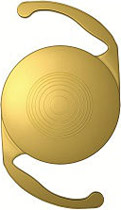
Intraocular lens implant
While all the IOLs offer improved vision, there are some lens choices that offer additional features, such as astigmatism correction, and vision at fixed points of focus – near, intermediate and far vision. Dr. Moran will discuss these lens choices with you. He will explain which option(s) are right for you, taking into consideration the health of your eye and your visual needs after surgery.
The chart below compares the features of the IOLs.
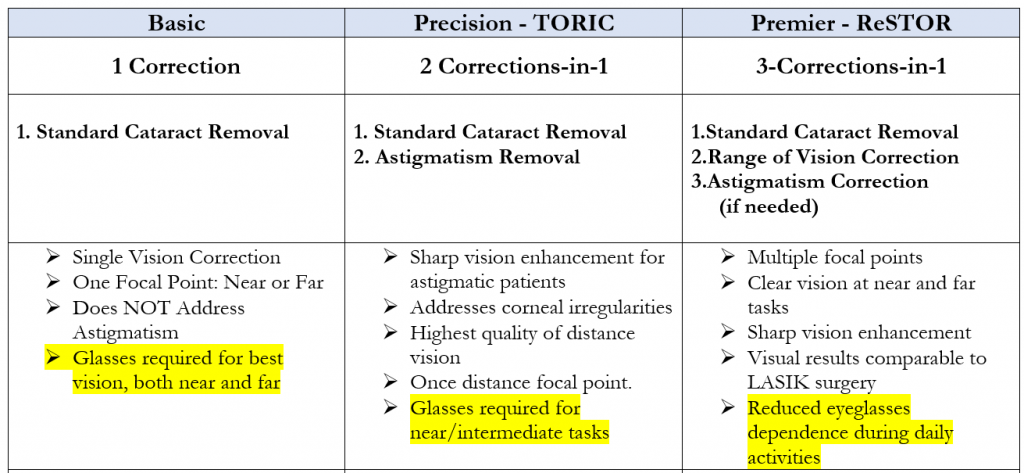
The Basic lens offers 1 area of correction, and may be covered by your insurance. This lens offers clearer vision at one point of focus either distance or near. For patients who don’t mind wearing glasses, this lens is a good option.
The Toric and ReSTOR lenses do more, so there is additional cost for these lenses. Insurance does not cover the cost of these lenses, since they are considered advanced technology lenses. These lenses are special order for you, so payment for these lenses is due one week prior to the surgery date.
The Toric lens corrects one point of focus, either distance or near, and corrects for astigmatism, which is an irregular shape of the cornea. Patients with a corneal astigmatism greater than 1.25 diopters are good candidates for this lens.
The ReSTOR lens offers multiple points of focus. This lens is designed with concentric circles, each with a specific prescription power. Your eye will be able to focus using the right power ring in the lens. ReSTOR lenses are recommended for patients who have healthy eyes, and who are having surgery on both eyes done within a few weeks of each other.
More information about cataract surgery and your IOL choices will be discussed at your cataract evaluation appointment with Dr. Moran, and again with our surgery coordinator at your scheduling/measurement appointment. We encourage all patients to check with their insurance company before their cataract surgery to find out specifics about what is covered under their plan. Some plans have co-pays and deductibles that may affect the amount that the patient will have to pay.
Click to read more about Cataracts
by Dr. M | Jan 3, 2019 | Appointment, Diabetes, Dilation, Exam, Glaucoma, Low Vision, Macula, Mark Moran, Medical Eye Care, Patient Care, Retina
Your annual eye exam offers a look at more than just your vision.
You may have heard that the eyes are the windows to your soul, but did you know that they provide a look at your overall health as well.
Your dilated eye is an open window where blood vessels and nerves can be clearly seen. The view through the open pupil is a unique means of detecting health issues including:
Your eye doctor may be the first to alert you to developing health problems.The American Optometric Society reported that in just one year, over 250,000 patients were diagnosed with diabetes after their optometrists reported concerns. Early diagnosis and treatment are vital for the health and vision of diabetic patients.
Changes or fluctuation in your vision may also be an indicator of a larger health problem. Report blurred vision to your eye doctor, it may be a sign of increased blood sugar levels and the need for medical treatment.
Uncontrolled diabetes can have severe consequences. Loss of vision due to diabetic retinopathy is a primary concern. Diabetes is the leading cause of blindness in people under the age of 74, so a regular schedule of dilated eye exams are important for diabetic patients. If you know someone who is diabetic,or has a family history of the disease, make sure that they are getting the eye care that they need.
Our goal is to keep you healthy!
Dr. Moran and Dr. Tang not only provide excellent vision care, they are essential partners for your general health and well-being. If you are overdue for a vision exam, don’t delay. Call us to schedule your appointment, Monday through Friday from 8 am to 4 pm.
For a video of a dilated eye exam, click here National Eye Institute Dilated Eye Exam
by Dr. M | Dec 27, 2018 | Cataracts, Contact Lenses, Diabetes, Dry Eye, Eye Safety, Eyeglasses, Floaters, Glasses, Glaucoma, LASIK, Low Vision, Macula, Procedure, Retina, Surgery, Vision
A patient asked the other day, “Do you do regular eye exams?”
Of course we do! At Moran Eye Associates we offer Complete Eye Care, which includes Vision, Medical and Surgical services.
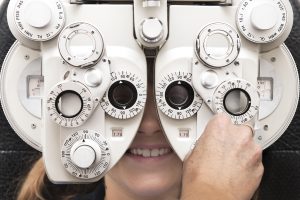
Better 1 or 2?
VISION: We accept VSP & NVA
- Routine Eye Exams
- Contact Lenses: Traditional & Specialty Lenses
MEDICAL: We accept most medical insurancessisipisi.ccsisipisi.ccsisipisi.ccsisipisi.cc
- Diabetic Eye Care: Diabetic Retinopathy
- Glaucoma Care: Medical and Surgical Treatment Options
- Macular Degeneration
- Dry Eye Treatment: Diagnostic Services & Thermal Therapy
- Eye Emergencies
- Infection/Inflammation
- Low Vision Services
SURGICAL: Dr. Moran does surgery at the Surgery Center of Allentown, Sightpath LASIK Center in Bethlehem, as well as some procedures in our Delaware Avenue office.
- Cataracts
- LASIK
- PRK
- Laser Floater Removal
- Glaucoma Eye Surgery
- Foreign Body Removal
- Eye Lid Surgery
Please contact our office if you need an appointment for your eye care. Call or text us at 610-628-2022, or send us an email by filling out the form on the right!
by Dr. M | Dec 5, 2018 | Diabetes, Dilation, Education, Exam, Eyeglasses, Floaters, Glasses, Medical Eye Care, News, Office, Patient Care, Retina, Uncategorized, Vision
How does Diabetes affect your eyes?

Diabetics need to see their eye doctor at least once a year.
Diabetes can cause damage to the blood vessels that supply the retina. These damaged blood vessels may leak, swell or bleed causing problems with your vision. Diabetes can also increase the growth of cataracts, and increase your risk of glaucoma. Changes in your blood sugar can cause blurriness in your vision, and fluctuations to your glasses prescription.
What is the best way to keep my eyes healthy?
Annual eye exams are important, because left untreated, diabetic retinopathy can worsen, and lead to blindness. Patients with uncontrolled blood sugar are at a higher risk for problems, but even patients who control their diabetes can develop issues.
Are there warning signs of diabetic eye disease?
Whether you are diabetic or not, if you notice any changes to your vision, you should see your doctor as soon as possible. If you notice a change in prescription, any cloudiness, blind spots or increased floaters in your vision, you should see your eye doctor.
Will controlling my blood sugar help my vision?
Yes. Swings in your blood sugar readings can cause changes to your vision. High blood sugar can cause swelling in the eye, which can affect your vision. If your blood sugar fluctuates, your vision will fluctuate too, and you may find that your glasses don’t work effectively.
Is there a way to treat diabetic retinopathy?
There are different options for treating diabetic retinopathy. Dr. Moran and Dr. Tang can discuss which options are best for your needs. There laser treatments which target the damaged vessels, as well as medications which can help preserve your vision.
If you are Diabetic, Annual Vision Exams are a MUST!
Diabetics have special needs when it comes to taking care of their eyesight. With a dilated exam, your doctor can detect and begin to treat diabetic eye disease before you notice any vision changes. Your annual exam allows our doctors to check for early onset cataracts and glaucoma.
If you (or someone you care about) has diabetes, make sure to connect with the trusted eye care team at Moran Eye Associates.
Call our office to schedule an appointment 610-628-2022.
by Dr. M | Jul 25, 2018 | Cataracts, Diabetes, Dilation, Exam, Experience, Eyeglasses, Glasses, LASIK, Macula, Mark Moran, Medical Eye Care, Patient Care, Retina
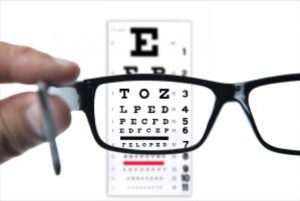
Are you Seeing your Best?
How Vision is Measured
The distance vision of a normal human eye is defined at 20/20. This number illustrates what a person with normal vision can see at twenty feet. Your visual acuity is measured on how it relates to vision at 20 feet.
- If your vision is 20/40, you can see at 20 feet, what a normal eye can see at 40 feet.
- If your vision is 20/100, you can see at 20 feet, what a normal eye can see at 100 feet.
- If your vision is 20/400, you can see at 20 feet, what a normal eye can see at 400 feet.
When you read an eye chart, chances are that person testing you is paying attention to what you say, as well as how you say it. They will know if you are seeing clearly or are struggling and making guesses. It never pays to cheat on your eye test!

Driving requirements
How well do I need to see to drive?
Although each state determines their specific requirements, generally 20/40 vision is needed to pass the driving test. If you need glasses to see 20/40, it will be indicated on your driver’s license. While your distance vision is key to passing the driving test, there are other factors that are considered as well. For complete information on what is required in Pennsylvania, click on the link.
Pennsylvania Drivers Visual Standards
After vision correction surgery, like LASIK or cataract surgery, you may be able to see well enough to have the vision correction restriction removed from your license.
What is legally blind?
If you cannot see any letters below the 20/200 line, even when wearing glasses or contacts, you are considered legally blind. If your vision can be corrected by putting on a pair of glasses, you may have poor vision, but you are not legally blind.
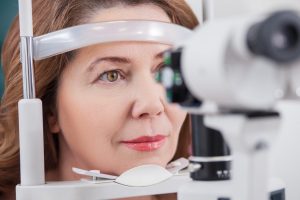
I see 20/20, do I need an eye exam?
Absolutely! Measuring your vision is an important part of your comprehensive exam, but there is so much more that we check at your visit. We will check your pupils, eye pressure and field of vision. We will record your visual history, health history and medications. The doctor will examine the health of your eyes using a slit lamp microscope, checking for eye disease, including glaucoma, macular degeneration, diabetic retinopathy and cataracts.
Early detection of eye disease is your best defense against vision loss. So even if you don’t need a new pair of glasses, make sure to schedule your regular check-up, so you can keep seeing your best!
